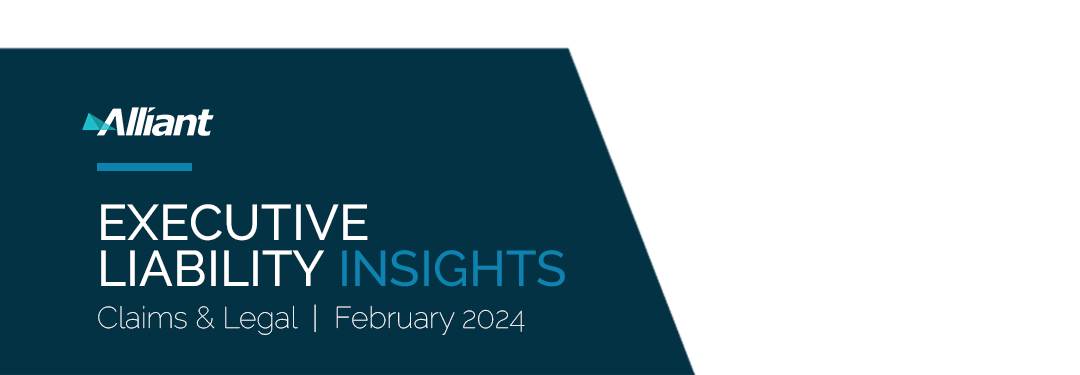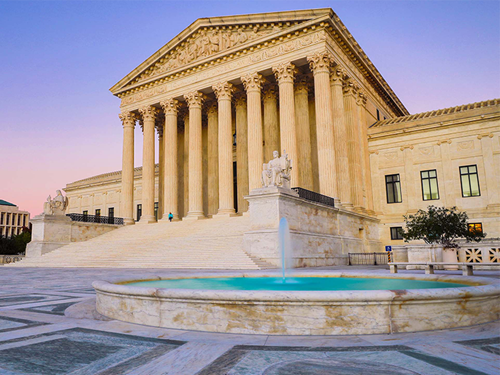
Navigating today’s complex risk environment can be a monumental task. Steve Shappell, Alliant Claims & Legal, spearheads Executive Liability Insights, a monthly review of news, legal developments and information on executive liability, cyber risk, employment practices liability, class action trends and more.


FEATURED ARTICLE
THE SUPREME COURT ESTABLISHES A WHISTLEBLOWER FAVORING FRAMEWORK FOR SARBANES-OXLEY ACT VIOLATIONS
Murray v. UBS Secs., LLC, 22-660 U.S. (Feb. 8, 2024).
In a landmark ruling, the U.S. Supreme Court held that under the Sarbanes-Oxley Act (the “Act”) whistleblowers are shielded from employer adverse treatment without the necessity to prove the employer’s retaliatory motive.
In This Issue:
CALIFORNIA JURY AWARDS SHAREHOLDERS $14.1 MILLION IN DAMAGES AFTER BUYOUT DEEMED MISLEADING AND UNFAIR
Lei Li et al. v. Arcsoft Inc. et al., 4:19-cv-05836 (N.D. Cal. Feb 5, 2024).
In a rare case that proceeded to a jury trial and final verdict, early investors (the “Investors”) in a private photo processing company (the “Company”) filed a breach of fiduciary duty action that resulted from alleged misrepresentations and concealment in connection with a buyout of their shares.
Read More >>
EXCESS CARRIER HAS NO DUTY TO DEFEND BASED ON “OTHER INSURANCE” CLAUSE
Harriman v. Associated Indus. Ins. Co., 2024 U.S. App. LEXIS 1642 (4th Cir. 2024).
In a recent decision involving a case of defamation against an investment advisor (the “Advisor”) for a financial brokerage firm, an appellate court held that an excess insurance carrier was never obligated to defend the Advisor because defense obligations were triggered under a primary insurance policy to which the defendant carrier’s policy sat only as excess.
Read More >>
COURT FINDS COVERAGE FOR LOSSES LEADING BACK TO A SYSTEM FAILURE
Southwest Airlines Company v. Liberty Insurance Underwriters, Inc., No. 22-10942 (5th Cir. Jan.16, 2024).
A federal appellate court recently ruled in favor of one of the nation’s largest airlines (the “Insured”) seeking coverage from its cyber insurance policy. The Insured had suffered a massive computer failure in 2016 which resulted in a three-day disruption of the airline’s flight schedule.
Read More >>
PONZI SCHEME FRAUDULENT TRANSFER INSURABLE AND NOT BARRED BY LENDING ACTS EXCLUSION
Huntington Nat'l Bank v. AIG Specialty Ins. Co., C.A. No. 23-3039, 2024 U.S. App. LEXIS 2369 (6th Cir. Feb. 1, 2024).
A bank sought coverage under its professional liability insurance for its settlement of a bankruptcy fraudulent transfer proceeding. The bank unwittingly made multiple loans to a fraudulent company that was part of a larger Ponzi Scheme (the “Scheme”).
Read More >>
A CONDITION PRECEDENT IN EXCESS POLICIES CAN LEAD TO COVERAGE BEING DENIED
Pharmacia Corp. N/K/A Pfizer, Inc. v Arch Specialty Ins. Co., No. 22-2586 (3d Cir., Jan. 19, 2024).
In the underlying action, shareholders of a pharmaceutical drug manufacturer (the “Manufacturer”), brought a lawsuit alleging that the Manufacturer artificially inflated stock prices by misrepresenting the results of a clinical drug study. The Manufacturer provided notice to its directors and officers' insurance tower.
Read More >>
THE OBJECTIVE/SUBJECTIVE TEST FOR PRIOR KNOWLEDGE EXCLUSIONS
Cantaloupe, Inc. v. Axis Ins. Co., C.A. No. 22-030, 2024 U.S. Dist. LEXIS 6928 (E.D. Pa. Jan. 11, 2024).
Coverage litigation arose from a carrier’s alleged breach of its Directors & Officers policy. The insured faced a series of lawsuits after disclosing to investors that there was an internal investigation of accounting and financial reporting issues.
Read More >>
WHETHER AN INDEPENDENT DIRECTOR IS TRULY INDEPENDENT IS A HIGHLY FACT-SPECIFIC QUERY
City of Pittsburgh Comprehensive Municipal Trust Fund v. William E. Conway, Jr. et al (Del. Chancery Court)
A large and sophisticated institutional investor (the “Investor”) brought a lawsuit against the founders and Board of a private equity group (the “Corporation”) alleging a breach of fiduciary duties in connection with a massive tax asset buyout.
Read More >>
CYBER CORNER
Click to read the following cases:
- PROPOSED FLORIDA LEGISLATION WOULD OFFER “SAFE HARBOR” TO CYBER-COMPLAINT BUSINESSES
- UNDERWRITERS REPORT RANSOMWARE ATTACKS INCREASED BY NEARLY 70 PERCENT IN 2023
Read More >>
EMPLOYMENT CORNER
Click to read the following cases:
- CONTENT OF A NOTICE MAY DETERMINE WHAT CONSTITUTES A CLAIM UNDER CLAIMS-MADE POLICY
Read More >>
SECURITIES CORNER
Click to read the following cases:
- ASEC UNVAILS NEW RULES IMPROVING DISCLOSURES RELATED TO SPAC AND de-SPAC TRANSACTIONS
- SEC EXPANDS DEFINITION OF SECURITIES DEALERS TO INCLUDE SOME PRIVATE FUNDS
- JANUARY 2024 NOTEWORTHY ENFORCEMENT ACTIONS FILED
- JANUARY 2024 NOTEWORTHY SETTLEMENTS AND JUDGEMENTS
Read More >>
SHAREHOLDER CORNER
Click to read the following cases:
- JANUARY 2024 SECURITIES CLASS ACTION FILINGS
Read More >>
THE SUPREME COURT ESTABLISHES A WHISTLEBLOWER FAVORING FRAMEWORK FOR SARBANES-OXLEY ACT VIOLATIONS
Murray v. UBS Secs., LLC, 22-660 U.S. (Feb. 8, 2024).


In a landmark ruling, the U.S. Supreme Court held that under the Sarbanes-Oxley Act (the “Act”) whistleblowers are shielded from employer adverse treatment without the necessity to prove the employer’s retaliatory motive. The holding significantly eases the burden on employees and may be viewed as overly encouraging of filing whistleblowing claims, even baseless ones.
In the case at issue, a research strategist (the “Employee”) who was required by the SEC to certify that his research was independent claimed to be pressured to “clear [his] research articles with the desk” before publishing them. After expressing ethical concerns to the supervisor on numerous occasions, the Employee was terminated. The Employee filed a complaint alleging that his termination was in response to his internal reporting of fraud on shareholders and, thus, violated the Act.
The lower court instructed the jury that the Employee only needed to show that the whistleblowing activity was just a contributing factor to the adverse employment decision of the employer. Then, to rebut the Employee’s allegations, the employer needed to establish by clear and convincing evidence that the Employee would have been terminated even if he had not engaged in protected activity. These instructions were reviewed by an appellate federal court which disagreed with the lower court’s holding that the Employee’s burden was limited to demonstrating that the whistleblowing activity was merely a contributing factor to termination. The appellate court vacated the judgment and held that the Employee needed to meet a higher burden of proof to prevail on the allegations of the Act’s violation by showing retaliatory intent on the part of the employer.
The Supreme Court, in reviewing the appellate court’s holding, disagreed with the appellate court, stating that the statute did not contain a heightened requirement of proving retaliatory intent. The Court criticized the appellate court for predicating its holding on the word “discriminate,” when that word, in the context of the surrounding statutory language, did not bear the weight that the employer and the appellate court attributed to it. The Court noted that whistleblowers play an important role in protecting the well-being of the public and the public welfare depends on their ability to feel empowered to come forward. Thus, the Court held that it “cannot override Congress’ policy choice by giving employers more protection than the statute provides.”
Two Justices concurred and stated that the majority erred in rejecting to see the requirement of an intent to discriminate in the statute’s language. The concurring justices believed that although Employee did not need to show that the whistleblowing activity was the sole reason for termination, they must have shown that the protected activity was the reason for the adverse conduct.
This decision could be viewed as one that encourages filings of futile whistleblower claims by bad-performing employees. However, the Court addressed the concern by reminding the parties that employers would retain the ability to prove by clear and convincing evidence that they would have reached the same decision regardless of the whistleblowing activity. The employers’ practical ability to defend themselves in the employee-favoring framework remains to be seen, following this decision.
CALIFORNIA JURY AWARDS SHAREHOLDERS $14.1 MILLION IN DAMAGES AFTER BUYOUT DEEMED MISLEADING AND UNFAIR
Lei Li et al. v. Arcsoft Inc. et al., 4:19-cv-05836 (N.D. Cal. Feb 5, 2024).


In a rare case that proceeded to a jury trial and final verdict, early investors (the “Investors”) in a private photo processing company (the “Company”) filed a breach of fiduciary duty action that resulted from alleged misrepresentations and concealment in connection with a buyout of their shares.
According to the complaint, the Investors were induced to sell their shares at an artificially low price because the Company hid information such as quarterly financial reports, audited financials, revenue projections, and a fairness opinion. Eventually, the jury sided with the Investors and determined that they were misled as to the Company’s current financial situation, near-term growth prospects, and further, that the Company hid the fact that an initial public offering (IPO) in China was in the works. After going public, the Company’s value skyrocketed over 30 times in value. According to the jury, had the Investors known the full story, they never would have sold their shares at such a low price.
EXCESS CARRIER HAS NO DUTY TO DEFEND BASED ON “OTHER INSURANCE” CLAUSE
Harriman v. Associated Indus. Ins. Co., 2024 U.S. App. LEXIS 1642 (4th Cir. 2024).


In a recent decision involving a case of defamation against an investment advisor (the “Advisor”) for a financial brokerage firm, an appellate court held that an excess insurance carrier was never obligated to defend the Advisor because defense obligations were triggered under a primary insurance policy to which the defendant carrier’s policy sat only as excess. The court relied on the Policy’s “Other Insurance” clause which stated that its coverage was “excess” unless another policy was written only as specific excess to any other valid and collectible insurance.
After the excess carrier denied coverage for the matter, the primary carrier only provided a defense from the date the matter was noticed (two years after the claim was made). The insured had significant pre-tender defense costs that they sought to recoup from the excess carrier. The court held that because the primary policy provided coverage to defend the defamation allegations, the second policy at issue (the excess) would act only as an excess insurer and was not obligated to provide the Advisor with a defense.
The Advisor argued that the excess policy was required to provide coverage and pay for the pre-tender costs that had been incurred in the Advisor’s own defense of the defamation case, arguing that the two policies were not “concurrent.” The court rejected this argument and reasoned that there was no ambiguity in either policy regarding the allocation of coverage and that the policy language “must be interpreted and enforced according to their plain and ordinary meaning.” The primary policy provided primary coverage “unless a series of inapplicable exceptions applied.” Given that there was already primary coverage in place, the excess carrier was not required to provide or pay for the Advisor’s defense.
COURT FINDS COVERAGE FOR LOSSES LEADING BACK TO A SYSTEM FAILURE
Southwest Airlines Company v. Liberty Insurance Underwriters, Inc., No. 22-10942 (5th Cir. Jan.16, 2024).
A federal appellate court recently ruled in favor of one of the nation’s largest airlines (the “Insured”) seeking coverage from its cyber insurance policy. The Insured had suffered a massive computer failure in 2016 which resulted in a three-day disruption of the airline’s flight schedule.


Weeks prior to the incident, the Insured had purchased a cyber risk policy (the “Policy”) that included a “System Failure Coverage” provision that provided that the insurer “shall pay all Loss . . . that an Insured incurs . . . solely as a result of a System Failure. . ..” The Insured sought and obtained coverage from the Policy’s primary insurer and two excess insurers for the Insured’s losses. Eventually, the Insured sought reimbursement from the third excess insurer (the “Excess”).
The Excess rejected coverage and challenged the Insured’s claimed losses, arguing that the insurable losses would total less than what is required to trigger the Excess’ policy. The Excess argued that the Insured’s attempt to mitigate issues stemming from the system failure, including the issuance of travel vouchers and refunds, extensions of sales promotions, and reimbursement of passengers’ incidental travel costs were either outside the scope of the Policy’s coverage, or fell within exclusions. The Excess further argued that the Insured’s losses were not incurred “. . .solely as a result of a System Failure” as defined in the Policy but were incurred voluntarily.
The appellate court rejected the Excess' argument and held that the Insured’s decisions to incur costs to mitigate business losses were part of “a causal chain that led back to the system failure." The court also rejected the Excess’ argument that the Policy did not cover the Insured’s “consequential damages,” reasoning that such a strict interpretation would render the coverage illusory.
Notably, the court clearly indicated that it was not deciding whether the Insured was entitled to full recovery of its costs. That issue would require a fact-specific determination which would have to be made by the trial court.
PONZI SCHEME FRAUDULENT TRANSFER INSURABLE AND NOT BARRED BY LENDING ACTS EXCLUSION
Huntington Nat'l Bank v. AIG Specialty Ins. Co., C.A. No. 23-3039, 2024 U.S. App. LEXIS 2369 (6th Cir. Feb. 1, 2024).


A bank sought coverage under its professional liability insurance for its settlement of a bankruptcy fraudulent transfer proceeding. The bank unwittingly made multiple loans to a fraudulent company that was part of a larger Ponzi Scheme (the “Scheme”). The bank’s team handling the account eventually grew suspicious and reported their suspicions to the bank’s security department (the “Department”). The Department discovered the FBI was investigating the company and that its CEO was blacklisted by the National Association of Securities Dealers and served time for fraud-related crimes. However, the Department never informed the account team of its discovery. The FBI later raided the company, discovering the Ponzi Scheme and that the company was bankrupt.
The bankruptcy trustee filed an adversary proceeding against the bank alleging that the bank put its own desire to have its loans repaid ahead of its suspicions surrounding the company. The trustee sought to recover alleged fraudulent transfers. Ultimately, the trustee was able to recover direct loan repayments, as well as indirect loan repayments from another entity involved in the Scheme. The recovery was limited to payments made after the Department failed to inform the account team of the FBI investigation. Throughout the adversary proceeding, the bank sought coverage and eventually demanded the contribution of its full insurance limit.
The carrier, although acknowledging the claim arose from the bank’s performance of banking services, denied coverage because the settlement did not amount to Loss under the policy’s definition. The carrier also argued that coverage would be barred by the policy’s Lending Acts exclusion which was defined as "any act[s] performed by an Insured for: (i) a customer or client of the Company relating to an extension of credit, a refusal to extend credit or an agreement to extend credit.” The exclusion barred claims “for the principal and/or interest of any unrepaid, unrecoverable, or outstanding credit." The bank brought a coverage action; however, the court found that the Loss was uninsurable under Ohio law and the Lending Acts exclusion would independently bar coverage. The bank appealed.
On appeal, the bank argued the settlement was insurable and the Lending Acts exclusion did not apply. The bank made loans to the company, which were fully repaid. Therefore, the claim could not be for unrepaid, unrecoverable, or outstanding credit. Thus, the settlement was based on wrongful acts in the performance of banking services and not on unrepaid funds. The carrier argued the exclusion applied because the claim amounted to the bank’s attempt to recover loan payments it was forced to return to the trustee.
The court determined the settlement was insurable because it was not akin to punitive damages and was not intended to punish an intentional bad act. The fraudulent transfer did not require a showing of intentional malice. The court also found both the bank’s and carrier’s application of the Lending Acts exclusion were reasonable interpretations of the language, rendering the exclusion ambiguous. Such ambiguity, according to the court, must be strictly construed against the carrier. As a result, the Loss was found to be insurable, and the exclusion did not bar coverage.
A CONDITION PRECEDENT IN EXCESS POLICIES CAN LEAD TO COVERAGE BEING DENIED
Pharmacia Corp. N/K/A Pfizer, Inc. v Arch Specialty Ins. Co., No. 22-2586 (3d Cir., Jan. 19, 2024).


In the underlying action, shareholders of a pharmaceutical drug manufacturer (the “Manufacturer”), brought a lawsuit alleging that the Manufacturer artificially inflated stock prices by misrepresenting the results of a clinical drug study. The Manufacturer provided notice to its directors and officers insurance tower.
After a decade of litigation, the case finally settled. The Manufacturer provided the eighth excess insurer (the “Insurer”) with proof that the underlying excess insurers had paid their policy limits and sought coverage from the Insurer. The Insurer, Twin City Fire Insurance, denied coverage asserting that although the underlying insurers had ultimately paid their limits, the underlying insurers had not “duly admitted liability.” The Manufacturer sued the Insurer seeking a declaration that the policy obligated the Insurer to indemnify them for losses incurred in the underlying lawsuit.
This court, agreed with the lower court, and held that the policy at issue unambiguously imposed two conditions precedent to trigger coverage. Specifically, the Manufacturer had to show that the excess insurers ahead of the Insurer at issue (1) “duly admitted liability and [(2)] … paid the full amount of their respective liability.” According to the court, the Manufacturer failed to show that both conditions necessary to trigger the Insurer’s coverage were met. The court continued stating “[r]egardless of whether the other insurers in the tower paid their policy limits, the record does not demonstrate that all of those insurers admitted liability.” The coverage condition was not satisfied because six of the underlying carriers ahead of the Insurer at issue initially disclaimed liability. Since the Manufacturer failed to establish one of the two conditions precedent, the Insurer was allowed by the court to use this technicality and deny coverage.
The Takeaway
THE OBJECTIVE/SUBJECTIVE TEST FOR PRIOR KNOWLEDGE EXCLUSIONS
Cantaloupe, Inc. v. Axis Ins. Co., C.A. No. 22-030, 2024 U.S. Dist. LEXIS 6928 (E.D. Pa. Jan. 11, 2024).


Coverage litigation arose from a carrier’s alleged breach of its Directors & Officers policy. The insured faced a series of lawsuits after disclosing to investors that there was an internal investigation of accounting and financial reporting issues. The carrier denied coverage based on the Prior Knowledge Exclusion (“PKE”) alleging the insured’s CFO knew the company had issues with aspects of its core business and accounting practices that could lead to a claim.
The court applied a hybrid objective/subjective test to determine whether the PKE could bar coverage. Under the test, the court considered whether an objectively reasonable insured would have expected a claim, as well as whether the actual insured would expect a claim based on their subjective knowledge of then-existing facts. The carrier argued that the mere fact that the accounting issues encompassed aspects of the company’s core business meant that an objective insured could have reasonably expected a claim. The court determined this only addressed the objective prong of the analysis and failed to consider the CFO’s subjective knowledge of the internal investigation. Ultimately, the court focused on the insured’s subjective knowledge and whether the insured believed there was a significant structural reporting issue or an insignificant error that could be easily corrected without reasonably giving rise to a claim. According to the court, this was an issue of fact to be determined by a jury and denied the motion for summary judgment.
WHETHER AN INDEPENDENT DIRECTOR IS TRULY INDEPENDENT IS A HIGHLY FACT-SPECIFIC QUERY
City of Pittsburgh Comprehensive Municipal Trust Fund v. William E. Conway, Jr. et al (Del. Chancery Court)


A large and sophisticated institutional investor (the “Investor”) brought a lawsuit against the founders and Board of a private equity group (the “Corporation”) alleging a breach of fiduciary duties in connection with a massive tax asset buyout. The Investor alleged that shareholders were induced to overpay for “virtually worthless” tax benefit agreements (“TRAs”). The Investor specifically alleged key insiders of the Corporation earned millions for these TRA’s while the shareholders received nothing in return for their investments.
The Corporation filed a motion to dismiss and argued that the shareholders failed to make a derivative demand on the Board prior to initiating litigation. The court considered whether one or more of the directors had a conflict of interest which would impact whether the shareholders were excused from the derivative demand requirement.
Delaware law ordinarily requires shareholders to report the alleged misconduct to the company’s board before filing with a court, unless at least half of a company’s board is compromised by conflicts of interest. Here, the shareholders bypassed making a demand on the Board and argued they were justified in doing so because at least half of the Board was compromised or conflicted and such a demand would have been “futile.”
The court denied the motion to dismiss based on the independent directors’ “impartiality.” According to the court, the well-pled connections made it “reasonable to infer” that the independent director lacked independence from the co-founder because it found too many links tied to the co-founder of the Corporation. The court made this determination after a highly fact-specific inquiry into the personal and professional relationships involved, including their extracurricular philanthropic activities.
Cyber Corner
PROPOSED FLORIDA LEGISLATION WOULD OFFER “SAFE HARBOR” TO CYBER-COMPLAINT BUSINESSES
Government efforts to regulate cybersecurity have been criticized for often having the effect of punishing the victim. A bill pending in the Florida legislature takes a radically different approach. HB473 would offer a safe harbor against data breach litigation to businesses operating in Florida that maintain a robust level of cybersecurity in compliance with government and industry standards.
UNDERWRITERS REPORT RANSOMWARE ATTACKS INCREASED BY NEARLY 70 PERCENT IN 2023
Despite a slight drop in the final quarter of the year, ransomware attacks increased by 68% in 2023 to reach an all-time high, according to a report from Corvus, a leading underwriter of Cyber insurance. Drawing upon data from “leak sites” on the so-called “dark web” where cybercriminals ply their trade, this past year saw 4,496 victims of ransomware, up from 2,670 in 2022.
Employment Corner
CONTENT OF A NOTICE MAY DETERMINE WHAT CONSTITUTES A CLAIM UNDER CLAIMS-MADE POLICY
AIG Specialty Ins. Co. v. Agee, 22-5410 (E.D. La. Jan. 26, 2024).
In a recent decision, a court found in favor of an insurance company (the “Carrier”) of a bankrupt employer (“the Insured”), holding that the Carrier was not required to provide coverage for the judgment issued to the Insured’s former Area Vice Presidents (the “Employees”) due to wage and hour and contract exclusions.
Securities Corner
SEC UNVAILS NEW RULES IMPROVING DISCLOSURES RELATED TO SPAC AND de-SPAC TRANSACTIONS
Recently, the SEC approved a set of new rules (the “Rules”) that will greatly change the disclosure and liability requirements that govern SPACs, and de-SPAC transactions. According to the SEC, these rules aim to "protect investors by addressing information asymmetries, misleading information and conflicts of interest in SPAC and de-SPAC transactions."
SEC EXPANDS DEFINITION OF SECURITIES DEALERS TO INCLUDE SOME PRIVATE FUNDS
The SEC recently approved rules expanding the definition of "dealer" under the Securities Exchange Act of 1934. The SEC identified market participants that it believes engage in liquidity providing activities while trading in their own accounts similar to those performed by “dealers”, and despite a significant share of market volume, do not need to register with the SEC.
|
Director/Officer |
Role |
Company |
|
Gopala Krishnan, Manivannan Shanmugan, & Sakthivel Palani Gounder |
Founders |
Nanban Ventures LLC |
|
Shanchun Huang |
Former CEO |
Future FinTech |
|
Karen Rosenberger |
CFRO |
Synchronoss Technologies, Inc. |
|
Director/Officer |
Role |
Company |
|
Gopala Krishnan, Manivannan Shanmugan, & Sakthivel Palani Gounder |
Founders |
Nanban Ventures LLC |
|
Shanchun Huang |
Former CEO |
Future FinTech |
|
Karen Rosenberger |
CFRO |
Synchronoss Technologies, Inc. |
JANUARY 2024 NOTEWORTHY SETTLEMENTS AND JUDGMENTS
|
Amount |
Director/Officer |
Role |
Company |
|
$1,126,606 |
Joshua Dax Cabrera |
Former CEO |
Medsis International, Inc. |
|
$297,345.59 |
Jeremy Barbera |
Former CEO |
Nenobeak Biotech Inc. |
|
$567,500 |
Gregory Grenda |
Former CCO |
Grenda Group, LLC |
|
$600,000 |
Craig Sproule |
Founder |
Crowd Machine, Inc. |
|
Amount |
Director/Officer |
Role |
Company |
|
$1,126,606 |
Joshua Dax Cabrera |
Former CEO |
Medsis International, Inc. |
|
$297,345.59 |
Jeremy Barbera |
Former CEO |
Nanobeak Biotech Inc. |
|
$567,500 |
Gregory Grenda |
Former CCO |
Grenda Group, LLC |
|
$600,000 |
Craig Sproule |
Founder |
Crowd Machine, Inc. |
Source: U.S. Securities and Exchange Commission
https://www.sec.gov/litigation/admin.htm
Source: Stanford Law School Securities Class Action Clearinghouse
ABOUT ALLIANT INSURANCE SERVICES
Alliant Insurance Services is the nation’s leading specialty broker. In the face of increasing complexity, our approach is simple: hire the best people and invest extensively in the industries and clients we serve. We operate through national platforms to all specialties. We draw upon our resources from across the country, regardless of where the resource is located.
Contributors


Abbe Darr, Esq.
Claims Attorney
abbe.darr@alliant.com
David Finz, Esq.
Claims Attorney
david.finz@alliant.com
Isabel Arustamyan, Esq.
Claims Attorney
isabel.arustamyan@alliant.com
Jacqueline Vinar, Esq.
Claims Attorney
jacqueline.vinar@alliant.com
Jaimi Berliner, Esq.
Claims Attorney
jaimi.berliner@alliant.com
Karina Montoya, J.D.
Claims Advocate
karina.montoya@alliant.com
Malia Shappell, Esq.
Claims Attorney
malia.shappell@alliant.com
Michael Radak, Esq.
Claims Attorney
michael.radak@alliant.com
Peter Kelly, Esq.
Claims Attorney
peter.kelly@alliant.com
Robert Aratingi
Senior Claims Advocate
robert.aratingi@alliant.com
Steve Levine, Esq.
Claims Attorney
slevine@alliant.com